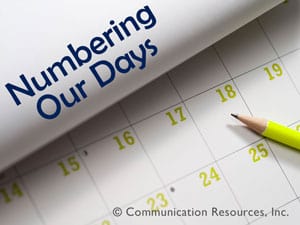Numbering Our Days

“So, teach us to count our days that we may gain a wise heart” (Psalm 90:12, NRSV).
The turn of the calendar to a new year brings to mind the perception that time seems to be moving ever faster these days. Perhaps that’s the product of middle age — being on the downhill portion of the rollercoaster, so to speak. But I suspect it’s also about feeling the press of many obligations filling up said calendar at the beginning of a new year. In the post-Christmas malaise, many of our folks are able to breathe a sigh of relief (at least until the credit card bill arrives), but there is no rest for weary clergy. Sunday comes at us relentlessly week after week.
Good time management wasn’t exactly in the curriculum of most of our seminary educations. My days in the military were a lot more helpful in that respect, when everything had to be done with synchronized watches, and days and nights mixed together during long stretches in the field. Seminary preaching professors sounded a little like drill sergeants when they told us with grave faces that we should spend an hour in the study for every minute we spend in the pulpit. Clearly, they had forgotten about the unexpected barrage of incoming funerals, meeting minefields, denominational firefights, and late-night road marches back home from the church that threaten to blow up the pastor’s calendar.
I’ve tried a bunch of different time management strategies over the last three decades of ministry. I hauled around a giant Franklin Planner, tapped away on a Palm Pilot, grooved in Google Calendar and thumbed appointments into my smartphone, among other techniques. Even with beeps, boops, texts and all kinds of reminders that are endemic to modern time management technology, it’s still a constant challenge to keep up. Just the other day I was supposed to have breakfast with a colleague, but he failed to show up. When I texted him to see what was up, he said he had put the right date and time down in his phone — just the wrong year. At least we’re now planned well in advance!
All this technology designed to help us manage time seems to actually make it more unmanageable sometimes. It got to the point that I began to look at my old Franklin Planner gathering dust on the shelf in my home office with nostalgic whimsy. It was then, however, that another colleague introduced me to a very simple, very inexpensive, non-powered, expandable system of managing not only one’s time but one’s whole life.
It’s a solution called “bullet journaling,” and all it takes is a pen and a notebook.
We usually think of journals as the place where we write endless prose revealing our deepest thoughts and meditations. Bullet journaling can handle that, but also handle your daily to-do list, notes from meetings, sermon research, your daily workout log, and whatever else you choose to set up within it. I still keep my digital calendar in my phone, but my bullet journal is where I flesh out my day in pen and ink using a series of symbols and quick notes in a notebook that is my constant companion.
I don’t have the space here to give you the full description of how it works, but it does. You can get a primer on the system by looking up bulletjournal.com on your web browser (it’s free). Several of my clergy friends have been using the same system, and we are all experiencing major victories when it comes to not only tracking time but using it mindfully and meaningfully. Studies have shown that writing something down with a pen and paper leads to better memory retention than typing it out on a screen, and I have found this to be true. I populate my journal during my devotional time in the morning, going over my to-do list and notes for the day (and even jotting notes about my dreams from the night before), and I end the day looking over what happened and adding other notes of things I want to make sure I address tomorrow. It’s like adding an administrative section to the Daily Office of prayer.
The psalmist reminds us that our days are numbered, and the more we number them, keep track of them and use them wisely, the more wisdom we receive and the less stress we take on. If you’re looking for a system to help you redeem your time in the new year, give bullet journaling a try.
It’s one ecclesiastical bullet you won’t have to dodge!
Share this Post:
Looking for More?
Imagine having fresh help in preparing your sermons right at your fingertips, especially during those weeks when your words and ideas are not flowing easily. Homiletics Online won’t write the sermon for you but once you’ve used this treasury of solid content, you’ll wonder how you ever got along without it.
Would you like to see your post on this blog?
We are always looking for talented and passionate writers who want to share their ideas on preaching the Gospel. If that sounds like you, then please use the button to submit a guest post.

